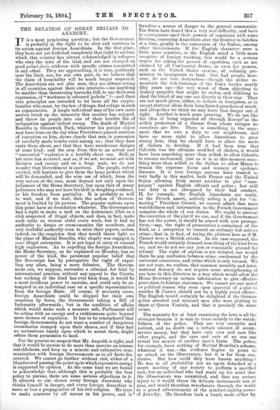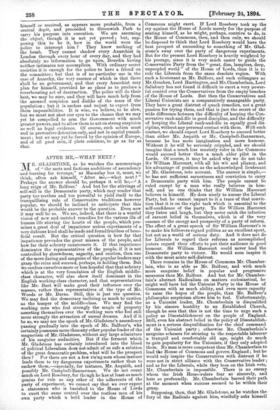THE RELATION OF GREAT BRITAIN TO ANARCHY.
IT is a most perplexing question ; but the Government is probably in the right to be slow and cautious in its action against foreign Anarchists. In the first place, they have not yet forfeited completely that right to asylum which this country has always acknowledged in refugees who obey the laws of the land, and are not charged on good primd-facie evidence with specific crimes committed in any other. They are approaching, it is true, perilously near the limit, nor, for our own part, do we believe that the claim of hospitality will be much longer respected. The Anarchists are not able men, they are always acting in all countries against their own interests—can anything be madder than threatening barracks full, to use their ewn expression, of " workmen in coloured jackets " ?—and their very principles are intended to let loose all the crypto- lunatics who must, by the law of things, find refuge in such an organisation. A single individual may of his own mere motion break np the immunity this country has enjoyed, and throw its people into one of their terrible fits of indignation against violent wrong. The death of Martial Bourdin in Greenwich Park, whatever his precise object may have been on the day when Providence passed sentence of execution on him, shows clearly that men in possession of carefully made bombs exist among us ; that they dare carry them about, and that they have murderous designs of some kind ; and the step from this to an actual and " successful " explosion is a terribly short one. Still, as yet none has occurred, and as, if we act, we must act with decision and energy and on a large scale, we do not wonder that Government is cautious. The people, unless excited, will hesitate to give them the large powers which will be demanded, and the wise use of which, from the very nature of the case, must depend not only upon the judgment of the Home Secretary, but upon that of many policemen who may not have his skill in weighing evidence, or his freedom from partiality. It is probably as well to wait, and if we wait, then the action of Govern- ment is limited by its powers. The popular notions upon this point have no foundation whatever. The Government had a right to make a raid on the Autonomie Club as a club suspected of illegal objects, and does, in fact, make such raids on vicious clubs every week, but it had no authority to detain or cross-examine the members, and very doubtful authority even to seize their papers, unless, indeed, on the suspicion that they would throw light on the plans of Martial Bourdin, who clearly was engaged in some illegal enterprise. It is not legal to carry or conceal high explosives. As to expelling the foreign Anarchists, the Home Secretary, as he explained on Monday, has no power of the kind, the persistent popular belief that the Sovereign has by prerogative the right of expel- ling any alien, being a mere delusion. The Govern- ment can, we suppose, surrender a criminal for trial by international practice, without any appeal to the Courts, but nothing of the kind has ever been done, it would be a most invidious power to exercise, and could only be at- tempted in an individual case on a specific representation from the foreign State. Of course, if necessity arose, foreign Anarchists could be shipped for their own countries by force, the Government taking a Bill of Indemnity afterwards ; but in the condition of affairs which would make such a measure safe, Parliament will be acting with an energy and a ruthlessness quite beyond mere decrees of expulsion. It has to be remembered that foreign Governments do not want a number of dangerous incendiaries dumped upon their shores, and if they had no accusations bandy upon which to arrest them, might refuse them permission to land.
For the present we suspect that Mr. Asquith is right, and that it would be unwise to do more than exercise an intense watchfulness, and keep up a minute and exhaustive com- munication with foreign Governments as to all facts dis- covered. We cannot go further without risk, either of a blunder or of passing the point up to which repressive energy is supported by opinion. At the same time we are bound to acknowledge that, although this is probably the best policy to pursue, there are some serious objections to it. It attracts to our shores every foreign Anarchist who thinks himself in danger, and every foreign Anarchist is more or less a propagandist of his evil religion. He tries to make converts by all means in his power, and is therefore a source of danger to the general community. The Swiss have found this a very real difficulty, and have in consequence used their powers of expulsion with some freedom, conveying Anarchists over the frontier in batches at a time, greatly to the annoyance of the Italian, among other Governments. If the English character were a little more sensitive, or the English mind a little more receptive of foreign teaching, this would be a serious reason for asking for powers of expulsion, such as are claimed by all Continental States, or even for powers, such as the United States exercise, of refusing per- mission to immigrants to land. Our bad people, how- ever, do not love destruction—though the writer re- members the rick-burnings of the Essex border nearly fifty years ago—the very worst of them objecting to destroy property that might be stolen, and disliking to shed the blood of any one not directly in their way. They are not much given, either, to believe in foreigners, or to accept abstract ideas from long-haired preachers of revolt. and altogether we think we may leave that danger out of sight. Another is much more pressing. We do not like the idea of being regarded all through Europe' as the selfish protectors of a disease from whose ravages we ourselves are free. There is something in the argu- ment that we owe a duty to our neighbours, and have no more right to allow Anarchism to grow strong here, than we should have to allow the seeds of cholera to develop. If it had been true that Calcutta was the ultimate seed-bed of cholera, it would have been something more than selfish to allow Calcutta. to remain uncleansed, just as it is at this moment some- thing more than selfish in the Sultan to allow Mecca to remain the supreme focus and nursery of epidemic diseases. It is true foreign nations have treated u,4 very badly in this matter, both France and the United States allowing Irish secret societies to plot " cam- paigns " against English officials and police ; but still our duty is not abrogated by their bad conduct. If, for example, the English Anarchists are really, as the French assert, actively aiding a plot for "re- moving " President Carnot, we cannot admit that mere watchfulness and information to the French Government comprise the whole of our duties. We ought to prevent the execution of the plot if we can, and if the Government has not the power, it should be armed with new preroga- tives,—say, the right of prosecuting a conspiracy of the kind, as a conspiracy to commit an ordinary but serious crime ; that is, in fact, of trying the plotters here as if M. Carnot were a British citizen. In the case supposed, the French would certainly demand something of the kind from us ; and we do not see any just or reasonable ground for refusal. The right of asylum is not violated, nor would there be any confusion between crime condemned by the universal conscience, and crime which is only treason. We are not sure, we confess, that common morality and inter- national decency do not require some strengthening of our laws in this direction in a way which would allow the Home Secretary on certain information to give effective protection to foreign statesmen. We cannot see any moral or political reason why even open approval of a plot to murder M. Carnot should not be a highly penal offence. The English would certainly be delighted if the German police arrested and retained men who were plotting to shoot at Queen Victoria, and that is precisely the same crime.
The necessity for at least examining the laws is all the stronger because it is vain to trust entirely to the watch- fulness of the police. They are very energetic and patient, and no doubt use a certain amount of secret- service money, but they have only eyes and ears like other people, and the eyes and ears of no one can reveal the secrets of another man's brain. The police, for example, knew nothing of Martial Bourdin's scheme, whatever it was,—the evidence begins to point to an attack on the Observatory, but it is far from con- clusive. But how could they have known anything ? He was in all probability not an agent detached at a. secret meeting of any society to perform a specified task, but an individual who had made up his mind that the Observatory was unwatched, and that any serious injury to it would throw its delicate instruments out of gear, and would therefore reverberate through the world as a grand advertisement of the mischief-making power of Anarchy. He therefore took a bomb, made either by himself or received, as appears more probable, from a central depot, and proceeded to Greenwich Park to carry his purpose into execution. We are assuming the object, though it is not yet proved ; but, sup- posing this to be it, how in the world were the police to intercept him ? They knew nothing of the bomb. They cannot shadow every Anarchist in London through every hour of every day, and they had absolutely no information to go upon, Bourdin having neither intimates nor accomplices. With ordinary secret societies it is enough for the police to have a friend on the committee ; but that is of no particular use in the case of Anarchy, the very essence of which is that there shall be no government, and that every Anarchist may plan for himself, provided he so plans as to produce a reverberating act of destruction. The police will do their best, we may be sure, and they will have much help from the aroused suspicion and dislike of the mass of the population ; but it is useless and unjust to expect from them impossibilities. It is wise, we believe, to be slow, but we must not shut our eyes to the chance that we may yet be compelled to arm the Government with much greater powers, and to allow them to act on strong suspicion as well as legal. evidence. Of course, such action must end in preventive detention only, and not in capital punish. ment ; but we may yet be forced by the opinion of Europe, and of all good men, if plots continue, to go as far as that.



































 Previous page
Previous page